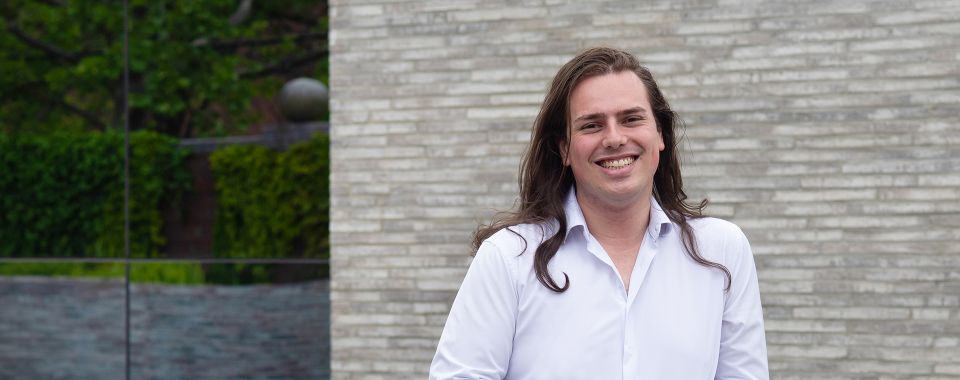
Francisco Sáenz, the 2023-2024 Maeder Fellow, stands outside Maeder Hall on Princeton’s campus. Photo by Bumper DeJesus
By Colton Poore
Andlinger Center for Energy and the Environment
The Maeder Graduate Fellowship in Energy and the Environment has been awarded to Francisco Sáenz, a graduate student in mechanical and aerospace engineering, for his work to study liquid metals and their applications to nuclear fusion.
The fellowship, supported by the Paul A. Maeder ’75 Fund for Innovation in Energy and the Environment, will cover Sáenz’s tuition and stipend for the 2023-24 academic year.
Nuclear fusion, the driving force of the sun and stars, could supply nearly limitless clean energy to society if scientists and engineers develop fusion reactors. But the staggering amount of heat that fusion generates poses a big problem for solid metal reactor components, which can melt, erode, and become brittle when exposed to the high temperature and pressure conditions inside a fusion reactor.
Sáenz believes that liquid metals could solve some of those overheating challenges, since their mobility could allow them to dissipate heat more effectively than solid metals.
“Liquid metals could have many advantages over solid metal reactor components,” Sáenz said. “They would not suffer from melting and erosion like solid metal components do. But at the same time, they come with their own set of challenges.”
Sáenz said that while liquid metals are theoretically able to flow quickly to dissipate the heat from a fusion plasma, the strong magnetic fields inside some fusion reactors exert a force known as magnetohydrodynamic (MHD) drag that opposes the flow of liquid metals. The drag slows the liquid metal flow, making it prone to overheating and evaporation.
Sáenz has devoted much of his graduate career to developing a liquid metal system capable of overcoming the challenges posed by the extreme conditions inside fusion reactors. Working closely with his advisor Egemen Kolemen, associate professor of mechanical and aerospace engineering and the Andlinger Center for Energy and the Environment, as well as research staff physicist at the Princeton Plasma Physics Laboratory (PPPL), Sáenz has studied a concept for fusion reactors he refers to as “divertorlets,” which he said would function like small trenches in divertors, the reactor components in fusion facilities that remove critical heat loads. He said the divertorlets could minimize the impacts of MHD drag by allowing liquid metals to flow continuously in a circular motion, helping to transfer the high heat loads from fusion plasmas more effectively.
Early in his graduate career and in collaboration with PPPL scientists, Sáenz built a prototype to confirm the underlying principles of the proposed divertorlets system. He also helped to develop the simulation tool, “FreeMHD,” the first experimentally validated open-source code to simulate flows under the strong magnetic fields of a fusion reactor.
Now, through the fellowship, Sáenz plans to upgrade FreeMHD to continue analyzing the divertorlets concept and understand how it might function under increasingly realistic reactor conditions. Sáenz will use those simulations to design and test an experimental setup at PPPL that applies the divertorlets concept to observe its performance under a variety of conditions, moving the promise of fusion energy closer to becoming a reality.
“My research group at Princeton has given me great ideas for my work, and I also have a network of collaborators at PPPL and beyond that have given me amazing tools to support me and my research,” Saenz said. “Being surrounded by all these creative minds has really motivated me to push the boundaries of what’s possible in the field of fusion energy.”
The Paul A. Maeder ’75 Fund for Innovation in Energy and the Environment supports the Maeder Fellowship, awarded to one or two graduates each year who demonstrate potential to develop technical solutions to sustain our energy and environmental future. The Andlinger Center for Energy and the Environment administers the fund and fellowship. More information on the program and past recipients can be found on the Maeder Graduate Fellowship page.
This story originally appeared on the Andlinger Center website.